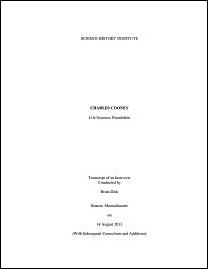Research interview with Erik De Clercq
- 2013-May-13
Research interview with Erik De Clercq
- 2013-May-13
Erik De Clercq was born in Dendermonde, Belgium in 1941. Some of his earliest memories as a child involve World War II and the festivities when Belgium was liberated. His mother was a tailor and his father worked as a chemist for a local fertilizer plant. He would often visit the plant with his father, which inspired him to pursue the sciences. De Clercq later attended the Catholic University of Leuven, where he decided to study medicine to combine his mother’s aspiration that he become a doctor and his father’s that he become a chemist. While studying, he balanced both his interest in chemistry and his burgeoning passion for internal medicine but ultimately decided to join the microbiology staff upon graduating in 1966. His mentor was Pieter De Somer, an entrepreneur who founded the antibiotic company Recherche Industrial Therapeutic. De Somer sent De Clercq to the United States to study interferons and with the encouragement of his wife, he settled on attending Stanford University. While at Stanford, De Clerq became interested in the university’s biochemistry courses and began attending them despite being unable to enroll in their PhD program. He extended his stay at Stanford an extra year but eventually returned to the University of Leuven in 1972, where he would complete his PhD with a thesis on the induction of interferons.
In his research, De Clercq became interested in reverse transcriptase and ultimately discovered Suramin, which he thought could treat leukemia. After his tests failed to produce the results he was hoping for, he classified his discovery but later published them in the journal Cancer Letters. While he continued with his interferon work, he eventually stopped pursuing this line of research due to his burgeoning work in small molecules and De Somer’s decreased interest in interferons. De Clercq began working with the chemist Antonín Holý on small molecules, particularly studying how anti-metabolites work against viruses. While Holý was initially hesitant, their eventual success with DHBA led them to publish their work in Science in 1978. In 1985, De Clercq’s work with phosphonates led to research into their use for herpes, HIV, and hepatitis B treatment. While he published his findings in Nature in 1986, the toxicity of the treatment prevented it from being implemented. His work on phosphonates was in collaboration with Bristol Myers Squibb. De Clercq worked extensively with John Martin, the director of research at Bristol Myers Squibb. When Martin left his position to join Gilead Sciences, Bristol Myers Squibb returned the compounds to Holý and De Clercq, who then joined Gilead and continued with their work on phosphonates. While working with Gilead, De Clercq helped to develop products such as cidofovir, adefovir, tenofovir, Truvada, Atripla, Complera, and Stribild. De Clercq retired from the University of Leuven upon turning sixty-five, thought he continues to teach in the Czech Republic seasonally.
| Property | Value |
|---|---|
| Interviewee | |
| Interviewer | |
| Place of interview | |
| Format | |
| Genre | |
| Extent |
|
| Language | |
| Rights | Creative Commons Attribution-NonCommercial-NoDerivatives 4.0 International License |
| Credit line |
|
About the Interviewer
Mark Jones holds a PhD in history, philosophy, and social studies of science from the University of California, San Diego. He is the former director of research at the Life Sciences Foundation and executive editor of LSF Magazine. He has served in numerous academic posts, and is completing the definitive account of the origins of the biotechnology industry, entitled Translating Life, for Harvard University Press.
Institutional location
| Department | |
|---|---|
| Collection | |
| Oral history number | 0156 |
Related Items
Cite as
See our FAQ page to learn how to cite an oral history.
Complete transcript of interview
de_clercq_e_0156ri_updated_full.pdf
The published version of the transcript may diverge from the interview audio due to edits to the transcript made by staff of the Center for Oral History, often at the request of the interviewee, during the transcript review process.









